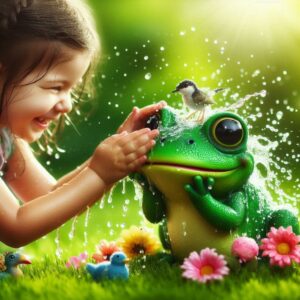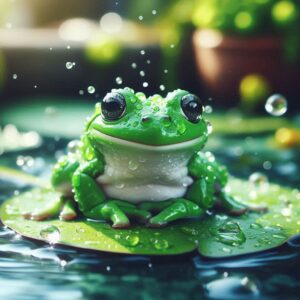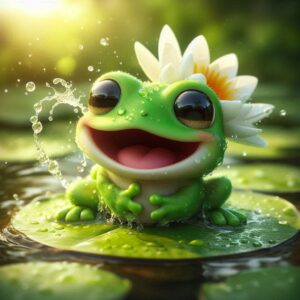蛙の顔に水とは?
「蛙の顔に水(かえるのかおにみず)」とは、何をされてもまったく動じない、平然としている様子をたとえたことわざです。どんな刺激や影響を受けても気にしない、鈍感である、または慣れてしまっている人や状況を表現する際に用いられます。
言葉の由来
蛙は水辺に生息し、常に顔や体が水に濡れている状態が自然な生態です。そのため、顔に水がかかってもまったく気にしないという様子から生まれた表現です。
このことわざは、蛙の生態的な特徴を比喩として取り入れたものであり、水が蛙にとって影響を及ぼさないという点を人間の精神的な無関心や平然とした態度に置き換えています。
意味の詳細
動じない態度
どんな非難や嫌がらせを受けても、まったく気にする様子がない人を指します。
例: 厳しい指摘にも「蛙の顔に水」のように受け流している。
慣れによる無感覚
何度も同じことを経験しているため、慣れてしまって反応が薄くなった状態を表します。
例: あの人はクレーム対応が得意で、どんなお客さんでも「蛙の顔に水」だね。
鈍感さの象徴
外部からの影響に鈍感で、他人の感情や意図をあまり気にしない態度を揶揄する場合にも使われます。
用例
日常生活での会話
「彼は上司に叱られてもまるで『蛙の顔に水』みたいで、全然堪えてないね。」
「何回注意しても響かない。蛙の顔に水だよ。」
仕事の場面
「厳しい意見を言っても、彼は気にしている様子がない。まるで蛙の顔に水だな。」
「営業の現場では、クレームに対して『蛙の顔に水』の精神が必要かもね。」
教育や育児の場面
「子どもに何度言っても反応が薄いと、『蛙の顔に水』って感じだよね。」
教訓と使い方
ポジティブな解釈
どんな状況でも冷静さを保てる、ストレスを受け流す能力が高いことを示す場合があります。特に、逆境に強い人をたたえる文脈で使われることもあります。
ネガティブな解釈
指摘や批判を真剣に受け止めず、成長や改善が見られない人への皮肉として使われることがあります。
状況に応じた柔軟な態度
必要以上に気にしないことは重要ですが、時には適切に反応することも大切です。「蛙の顔に水」が当てはまる場面では、無関心ではなく、状況を見極めて対応する姿勢も求められます。
類似する表現
「馬耳東風(ばじとうふう)」:他人の意見や批判をまったく気にせず、受け流す様子を指します。
「暖簾に腕押し」:手ごたえがなく、どんなに努力しても相手に響かない状況を表します。
「糠に釘(ぬかにくぎ)」:どんなに働きかけても効果がないことを意味します。
「柳に風」:柔軟に受け流して争わない態度を意味し、肯定的なニュアンスを持つこともあります。
現代的な適用と意義
ストレス社会におけるスキル
現代のストレスフルな社会では、「蛙の顔に水」のように適度に受け流す能力が必要とされています。特に、感情的な衝突を避けたり、ネガティブな言葉に引きずられない姿勢は重要です。
批判に対する受け止め方
無関心や無反応がかえって信頼を損ねることもあります。適切なリアクションを心がけることが大切です。
自己防衛としての活用
他人の意見や態度を必要以上に気にせず、自分の軸を保つための精神的なバリアとして、この考え方を役立てることができます。
「蛙の顔に水」は、何をされても動じない平然とした態度を表すことわざであり、批判的な意味にも肯定的な意味にも解釈されることがあります。この表現を通して、状況に応じて適度に受け流すことと、真剣に向き合うべき時のバランスを学ぶことができます。特に現代では、冷静さと柔軟な対応力を身につけることが、個人の成長や対人関係の円滑化に役立つでしょう。
Frog’s face is water” is a proverb that describes a person who is completely unperturbed or unperturbed by anything that is done to him or her. It is used to describe a person or situation that is unperturbed by, insensitive to, or accustomed to any stimulus or influence.
Origin of the word
Frogs live near water, and their natural ecology is to have their faces and bodies constantly wet with water. Therefore, the expression was born from the way they do not mind at all if water splashes on their faces.The proverb incorporates the ecological characteristics of frogs as a metaphor, replacing the point that water has no effect on frogs with the mental indifference and unconcern of humans.
More about the meaning
Unmoved attitude
Refers to a person who shows no sign of being bothered by any accusation or harassment.
Example: He/she passes on harsh remarks as if they were “water on a frog’s face.Insensitivity due to familiarity
Indicates a person who has experienced the same thing so many times that he/she has become accustomed to it and is less responsive.
Example: That person is so good at handling complaints that he/she is “water on a frog’s face” with any customer.Symbol of insensitivity
Also used to ridicule an attitude that is insensitive to external influences and pays little attention to the feelings and intentions of others.Examples of usage
Conversation in daily life
When scolded by his boss, he is like “water on a frog’s face” and doesn’t take it well at all.
No matter how many times I warn him, it doesn’t resonate. It’s water on a frog’s face.Work situations
“He doesn’t seem to mind when I give him a stern talking-to. It’s like water to a frog’s face.”
In the sales field, maybe we need to have a ‘water on a frog’s face’ mentality when it comes to complaints.”Educational and child-rearing situations
When you tell a child over and over again that he or she is not responding well, it’s like ‘water to a frog’s face.’”Lessons Learned and Usage
Positive Interpretation
May indicate a person’s ability to remain calm in any situation and to pass on stress. It may also be used in the context of praising someone who is particularly strong in adversity.Negative Interpretation
May be used as a sarcastic commentary on those who do not take pointers and criticism seriously and show no growth or improvement.Flexible attitude to situations
While it is important not to worry more than necessary, it is also important to react appropriately at times. In situations where “water on a frog’s face” applies, an attitude of assessing and responding to the situation, rather than indifference, is also required.Similar expressions
Baji-to-fu” (to hear or see the wind in one’s ears): This refers to the way one brushes off the opinions and criticisms of others, without paying any attention to them.
Warm noren ni umu oshi” (to push one’s arm through a blind blind curtain): This is a situation where there is no response, and no matter how hard one tries, it does not resonate with the other party.
Nuka ni nugui (a nail in the rice bran): This means that no matter how hard you try, it will have no effect.
Wind in the willows”: means a flexible, uncontested attitude, and can have a positive connotation.Contemporary Application and Significance
Skills in a Stressful Society
In today’s stressful society, the ability to pass the buck moderately, like “water to a frog’s face,” is needed. It is especially important to avoid emotional conflict and an attitude of not being drawn into negative words.Acceptance of Criticism
Indifference or non-response may instead undermine trust. It is important to react appropriately.Use as self-protection
We can use this concept as a mental barrier to keep our own axis without worrying about the opinions and attitudes of others more than necessary.Water in a frog’s face” is a proverb that describes an unperturbed and unconcerned attitude no matter what is done, and can be interpreted in either a critical or positive sense. Through this expression, we can learn to strike a balance between when to take a situation moderately and when to take it seriously. Especially in today’s world, learning to be calm and flexible will be helpful for personal growth and smooth interpersonal relationships.
AIが描いた「蛙の顔に水」







コメント